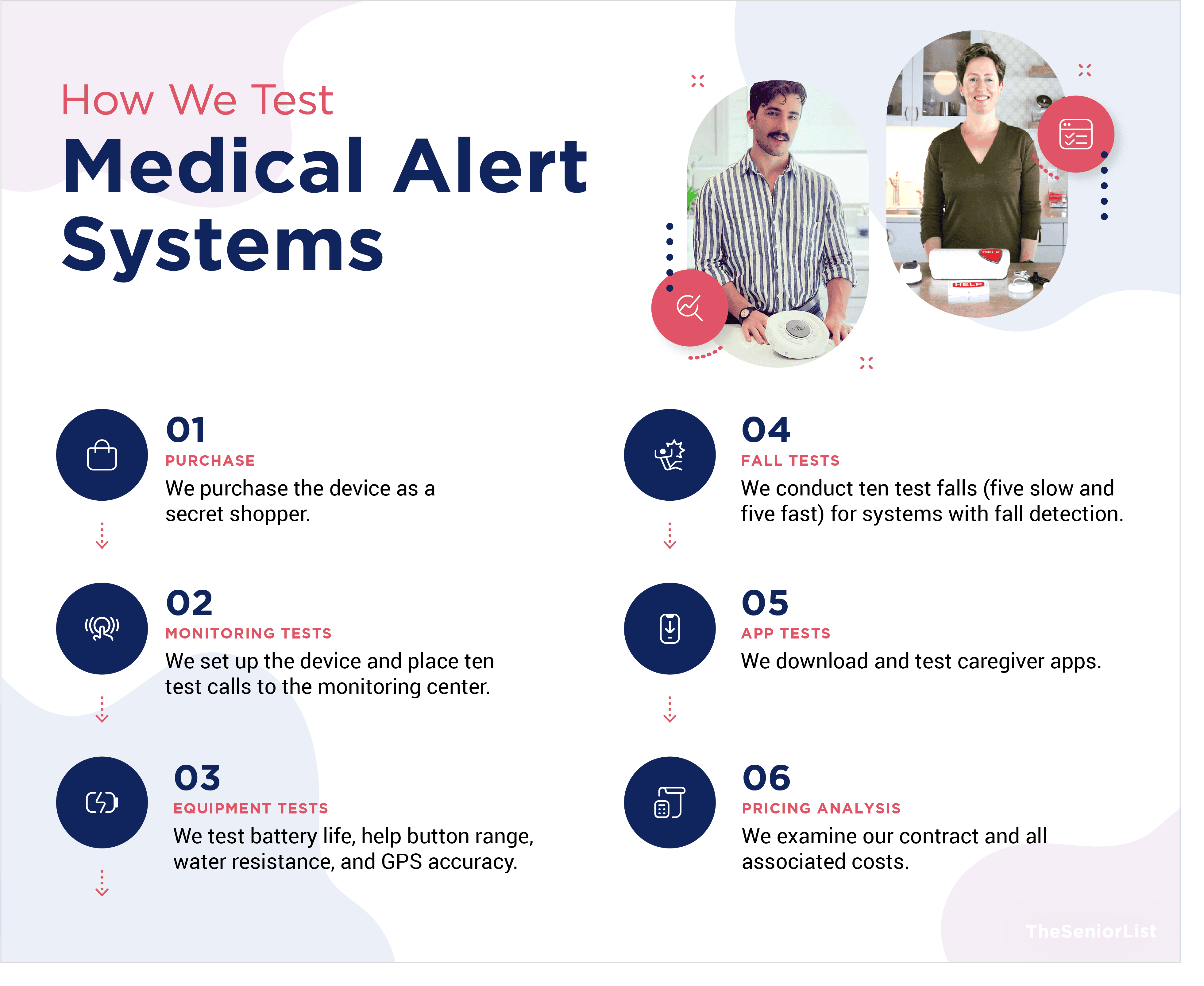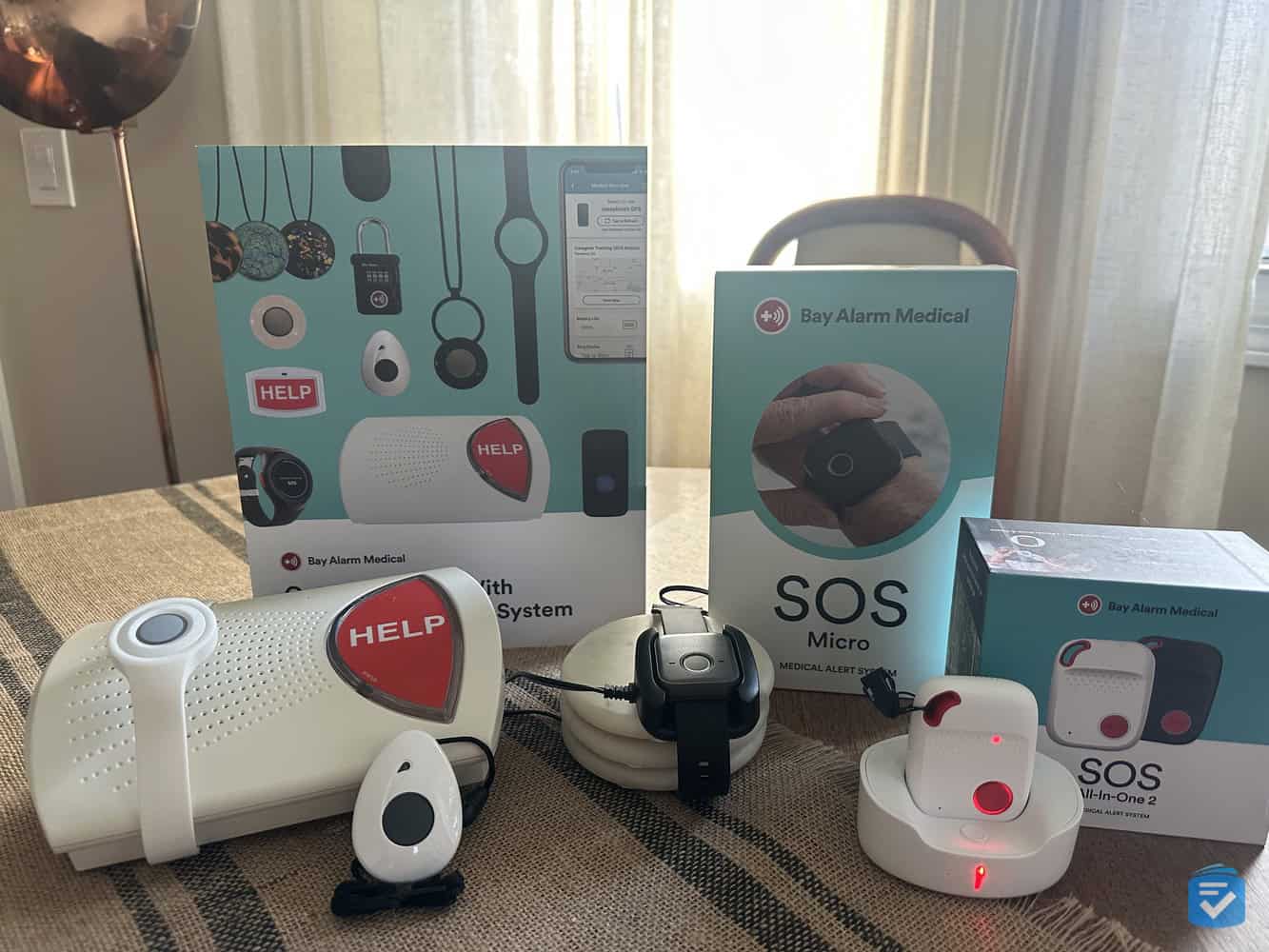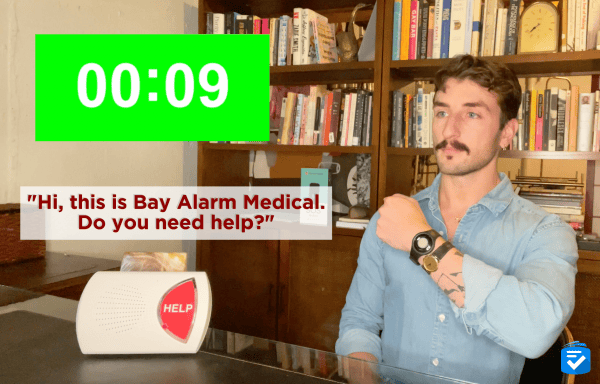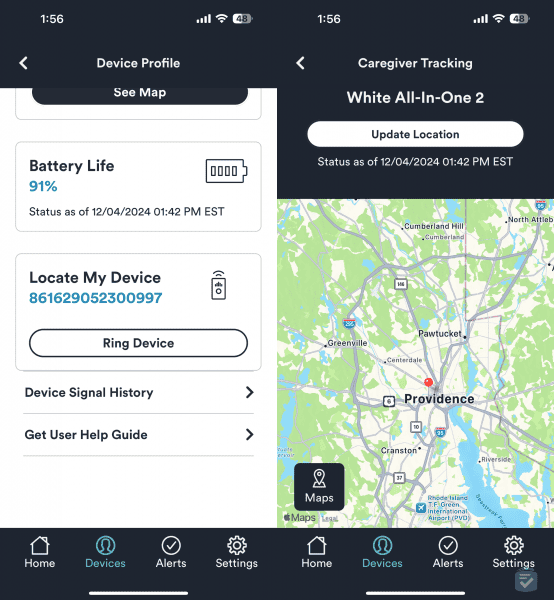Bay Alarm Medical vs. Life Alert Comparison

Key Findings
- In our series of test calls, Bay Alarm Medical connected us to help in an average of 16 seconds, compared to the 120-second average of Life Alert systems.
- Bay Alarm Medical systems start at $24.95 per month, while Life Alert’s systems start at $49.95 per month — not to mention Life Alert’s three-year minimum service agreements.
- Bay Alarm Medical offers optional features like fall detection and caregiver apps, while Life Alert has yet to introduce these capabilities.

Why Trust TheSeniorList?
At TheSeniorList, our team of caregivers, experts, and health-care professionals conducted over 5,000 hours of in-depth research and testing to recommend the most reliable brands and devices. In this process, our team:
- Tested 50 medical alert devices from 15 different brands.
- Surveyed 1,250 seniors and caregivers on medical alert system usage.
- Consulted with nurses, EMTs, and caregivers who are experts at caring for older adults.
- Published dozens of videos that demonstrate our medical alert system testing.
- Evaluated verified customer reviews of medical alert companies from the Better Business Bureau.
How We Test Medical Alert Systems

Most medical alert companies sell a variety of systems, including in-home systems, mobile systems, and smartwatches. Each device has its own unique features, but they all offer the same basic function: connecting a user to help in an emergency. With this in mind, we evaluate every medical alert system on the following criteria:
- Response times: The faster a medical alert system connects you to help, the better. For each system, we performed 10 test calls, counted how long it took to receive a response, and calculated an average.
- Ease of use: In an emergency, it’s important that a user can successfully activate their system. So, we carefully evaluated each device’s design — with simplicity at the forefront.
- Customer care: A human touch is key to caregiving. With this in mind, medical alert companies must offer impeccable customer service — from the agents at their monitoring centers to their support personnel.
- Pricing and contracts: We analyze device costs, subscription costs, contract requirements, and other fees associated with a medical alert system purchase.
- Extra features: We test out voice commands, caregiver apps, fall detection, activity monitoring, and any other features included with a medical alert system.
FYI: Which medical alert company comes out on top? To learn more, check out our pick for this year’s best medical alert system.

|

|
|
|---|---|---|
| Editor's Ratings | ||
| Starting Price (Home System) | $24.95 per month | $49.95 per month |
| Starting Price (Mobile System) | $29.95 per month | $69.95 per month* |
| Minimum Contract Requirement | 1 month | 3 years |
| Average Response Times | 16 seconds | 120 seconds |
| Fall Detection | $10 per month | Not available |
| Caregiver App | Included | Not available |
| Smartwatch Option | Yes | Not available |
| Contact | ||
| Phone Number |
Call for best price:
855-675-0754 |
|
| Website | View Packages Links to Bay Alarm Medical |
*Life Alert’s GPS help button costs $20 per month; however, it must be purchased in addition to the home system, totaling $69.95 monthly.
Bay Alarm Medical Overview

One of the most affordable medical alerts, Bay Alarm Medical is also one of our favorites due to its reliable monitoring, simple devices, and accurate fall detection. For in-home devices, they offer the SOS Home, which can be used with a cellular or landline connection. For mobile systems, they offer the SOS Micro, the SOS All-In-One 2, and the SOS Smartwatch.
In our tests with Bay Alarm Medical systems, their monitoring agents answered our calls in an average of 16 seconds — pretty fast overall! The agents were also professional and helpful.
To learn more about our experience with this company, check out our Bay Alarm medical alert review.
Bay Alarm Medical Devices Compared
| System | Monthly Cost | For Use | Additional Features |
|---|---|---|---|
| SOS Home |
|
At home |
|
| SOS All-In-One 2 | $34.95 | At home and on the go |
|
| SOS Micro | $29.95 | At home and on the go |
|
| SOS Smartwatch | $39.95 | At home and on the go |
|
Life Alert Systems Overview

Life Alert currently offers three different systems; these systems aren’t as clearly named as those offered by other companies. For example, Life Alert’s home system is sometimes referred to as the “Micro Voice Pendant System.” However, on our contract, it was called the “Master Unit.”
That said, the company currently offers a home system, a mobile system, and a wall-mounted help button. The one caveat would be that the mobile system and the wall-mounted help button must be purchased in addition to the home system. So, despite their seemingly low price tag of $20 per month, you’ll have to factor in the price of the home system: $49.95 per month.
To learn more about our experience with their systems, check out our full Life Alert review.
Life Alert Devices
| System | Monthly Cost | For Use | Additional Features |
|---|---|---|---|
| Home System | $49.95 | At home |
|
| GPS Help Button | $20* | At home and on the go |
|
| Wall-Mounted Help Button | $20* | At home |
|
*These devices are add-ons and must be purchased in addition to the Life Alert Master Unit.
Costs and Contracts
The most significant difference between Life Alert and Bay Alarm Medical would have to be their costs and contracts. For starters, Bay Alarm Medical systems are easily more affordable in terms of monthly payments. Their most affordable system costs $24.95 per month, and their mobile system costs $29.95 per month. Even if you add on fall detection — an extra $10 per month — you’ll still pay far less than you would for a Life Alert system.
On top of this, Life Alert requires you to lock into three-year contracts. While you’ll still pay on a monthly basis, you’ll be locked in for the next three years. The only way to get out of your contract is if a user passes away or transitions to a care facility.
Bay Alarm Medical, however, requires no long-term contracts. You pay on a month-to-month basis, and you can cancel your service and return your equipment at any time.
To learn more about the costs of these systems, be sure to check out my guide to Bay Alarm Medical costs and Life Alert costs.
Performance

With Life Alert systems costing more than just about every other medical alert device we’ve tested, we were shocked at how poorly they performed. In our series of test calls, we found that Life Alert response agents took an average of 120 seconds to answer.
You read that correctly: two whole minutes. Don’t believe us? Then watch this short video, in which our Managing Editor Ryan Molloy places a test call with a Life Alert system.
Sure, when Life Alert agents answered the call, they were courteous and helpful. And, yes, each of our devices was able to carry out the call with clear audio. But, we could not get past how long we had to wait before getting a response.
In contrast, Bay Alarm Medical systems connected us to help in an average of 16 seconds. Whether we placed test calls on the SOS Home or with the SOS Smartwatch, we were consistently connected to help in a quick fashion.
In terms of response times, Bay Alarm Medical is the clear winner.
Extra Features

When it comes to Life Alert, another sticking point for us is that they don’t have any devices for fall detction. This type of technology is not always accurate. However, fall detection devices are designed to automatically sense a majority of falls and contact monitoring agents who will assess the situation.
In contrast, Bay Alarm Medical offers fall detection as an add-on service for all of its systems. While fall detection costs an extra $10 per month with Bay Alarm Medical, we think that this technology can be a lifesaver for those with mobility issues. If you want to learn more about our top-rated fall detection device, read our MGMini Lite review.


Additionally, Bay Alarm Medical offers a free companion app for caregivers. Through this app, loved ones can keep track of a device’s location. They can also receive notifications when a system triggers an emergency call. Life Alert does not currently offer any type of app or portal for caregivers.
Our Top Choice

The answer is clear as day: Bay Alarm Medical is the better medical alert provider. Whether you want protection in or outside your home, Bay Alarm systems will perform better than Life Alert’s — and they’ll cost you a lot less. This is why Bay Alarm Medical is one of our favorite Life Alert alternatives.
To learn more about our favorite medical alert systems, be sure to check out our helpful guides:
Frequently Asked Questions
-
Which is better: Life Alert or Bay Alarm Medical?
While both medical alert companies offer quality equipment, Bay Alarm Medical systems cost less than half of Life Alert’s version. Additionally, Bay Alarm Medical requires no long-term contracts.
-
Does Life Alert have fall detection?
Life Alert does not support automatic fall detection of any sort. To contact response agents, a user must press their help button.
-
Which is more affordable: Bay Alarm Medical or Life Alert?
Bay Alarm Medical systems cost as low as $24.95 per month, and they require no activation fees. Life Alert, however, starts at $49.95 — and they require activation fees that approach $200.


